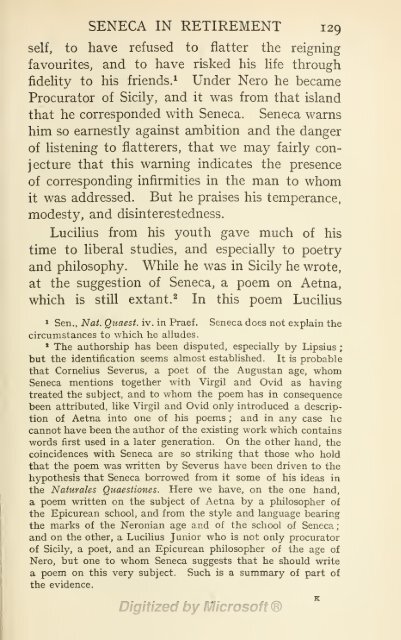Seneca - College of Stoic Philosophers
Seneca - College of Stoic Philosophers
Seneca - College of Stoic Philosophers
Create successful ePaper yourself
Turn your PDF publications into a flip-book with our unique Google optimized e-Paper software.
SENECA IN RETIREMENT 129self, to have refused to flatter the reigningfavourites, and to have risked his hfe throughfidehty to his friends. ^ Under Nero he becameProcurator <strong>of</strong> Sicily, and it was from that islandthat he corresponded with <strong>Seneca</strong>. <strong>Seneca</strong> warnshim so earnestly against ambition and the danger<strong>of</strong> listening to flatterers,that we may fairly conjecturethat this warning indicates the presence<strong>of</strong> corresponding infirmities in the man to whomit was addressed. But he praises his temperance,modesty, and disinterestedness.Lucilius from his youth gave much <strong>of</strong> histime to liberal studies, and especially to poetryand philosophy. While he was in Sicily he wrote,at the suggestion <strong>of</strong> <strong>Seneca</strong>, a poem on Aetna,which is still extant.^ In this poem Lucihus1Sen., Nat. Quaest. iv. in Praef.circumstances to which he alludes.<strong>Seneca</strong> does not explain the*The authorship has been disputed, especially by Lipsius ;but the identification seems almost established. It isprobablethat Cornelius Severus, a poet <strong>of</strong> the Augustan age, whom<strong>Seneca</strong> mentions together with Virgil and Ovid as havingtreated the subject, and to whom the poem has in consequencebeen attributed, like Virgil and Ovid only introduced a description<strong>of</strong> Aetna into one <strong>of</strong> his poems and in any case he;cannot have been the author <strong>of</strong> the existing work which containswords first used in a later generation. On the other hand, thecoincidences with <strong>Seneca</strong> are so striking that those who holdthat the poem was written by Severus have been driven to thehypothesis that <strong>Seneca</strong> borrowed from it some <strong>of</strong> his ideas inthe Naturales Quaestiones. Here we have, on the one hand,a poem written on the subject <strong>of</strong> Aetna by a philosopher <strong>of</strong>the Epicurean school, and from the style and language bearingthe marks <strong>of</strong> the Neronian age and <strong>of</strong> the school <strong>of</strong> <strong>Seneca</strong> ;and on the other, a Lucilius Junior who is not only procurator<strong>of</strong> Sicily, a poet, and an Epicurean philosopher <strong>of</strong> the age <strong>of</strong>Nero, but one to whom <strong>Seneca</strong> suggests that he should writea poem on this very subject. Such is a summary <strong>of</strong> part <strong>of</strong>the evidence.
















